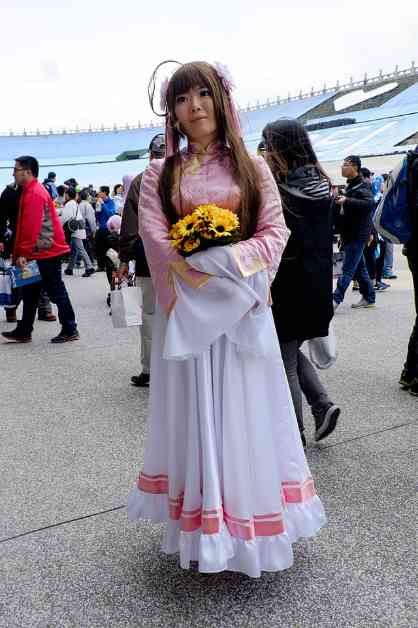The Humanization of Taiwan in Hetalia Fan Creations: Unveiling a World of Knowledge, Emotion, and Identity
In the realm of East Asian subcultural phenomena, the webcomic Hetalia: Axis Powers has emerged as a significant intellectual property since its debut in 2006. With a unique premise of personifying countries as distinct characters, Hetalia humorously navigates through world historical events and international relations. Each character embodies a different nation or region, reflecting their history, culture, and global interactions.
Taiwan, portrayed as a young girl in a peach-coloured qipao-style top and a long white skirt, is a prominent character in the series. Affectionately known as “Wan-Niang (灣娘)” in the Chinese-speaking fan community, Taiwan’s depiction has sparked a vibrant fan culture in both Taiwan and China. This fandom delves deep into exploring historical and political messages, intertwining emotions, and shaping identities within the realm of fan creations.
Exploring Knowledge Systems in Hetalia Fan Works
Renowned Fan Studies scholar Henry Jenkins defines fans as active participants who engage with media content, interpreting and extending its messages beyond the original narrative. Through fan works like fiction comics, music, and video games, fans create a rich tapestry of interpretations and narratives. Within the Hetalia fandom, the character of Taiwan offers creators vast creative freedom to delve into historical and political themes, reflecting the complexities of East Asian geopolitics.
The interactions within the Hetalia fandom highlight the convergence of three distinct knowledge systems. Firstly, the personification of nations in Hetalia allows for a unique expression of historical memory and cultural identity, resonating within subcultural communities. Secondly, audience reception and reinterpretation of information create dynamic interactions with the original work, fostering a fertile ground for fan fiction creation. Lastly, the differing understandings of Taiwan’s identity among young people from Taiwan and mainland China manifest in fan works, reflecting cognitive clashes and nuances in perceptions.
Interpretations of the Taiwan-China Relationship in Fan Creations
In the realm of fan works, the relationship between Taiwan and China, represented by the characters Wan-Niang and Wang Yao, is a subject of diverse interpretations. Fan creators have explored various portrayals of this relationship, ranging from familial ties to reflections on political realities and national identities.
Some fan works depict Wan-Niang as Wang Yao’s biological younger sister, emphasizing an inseparable bond aligned with China’s discourse on sovereignty over Taiwan. Conversely, other works challenge the notion of an “East Asian family,” portraying Taiwan’s relationship with China in a more nuanced light. Additionally, some interpretations showcase Taiwan and China as mirror-image characters, reflecting the complexities of the Republic of China and Chinese identity.
Emotion and Identity in Hetalia Fan Communities
The construction of online personas within the Hetalia fandom often revolves around the creators’ understanding and perception of real-world politics, particularly in the case of Taiwan. Fan creators navigate the delicate balance of addressing political implications while maintaining the purity of the fandom space as a beacon of peace.
Interviews with fans reveal the dual needs for self-validation and self-discipline within the Hetalia fandom, especially in the context of the Wan-Niang community. The reinterpretation of Taiwan within fan works reflects creators’ emotional connections and identity awareness, often navigating sensitive political landscapes with caution.
The Japan/Taiwan pairing within the fandom serves as a poignant example of the intersection of history, politics, and personal narratives. While some fans enjoy exploring romantic relationships between these characters, others find themselves navigating complex historical narratives and national sensitivities, highlighting the intricate dynamics within the fan community.
In conclusion, the Hetalia fandom surrounding Taiwan’s character delves deep into the realms of knowledge, emotion, and identity, offering a unique lens into the multifaceted nature of subcultural phenomena. Through fan creations, fans navigate political realities, historical narratives, and personal reflections, shaping a vibrant and dynamic community that continues to evolve and resonate with fans across the globe.












